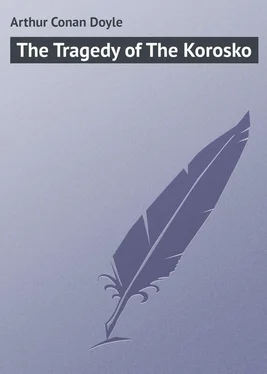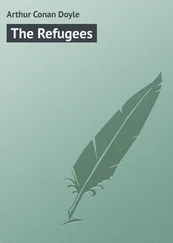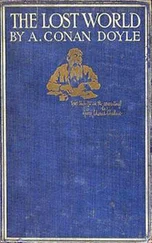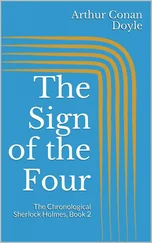Monsieur Fardet glanced across to where the red core of Colonel Cochrane's cigar was glowing through the darkness.
"You are an American, and you do not like the English," he whispered. "It is perfectly comprehended upon the Continent that the Americans are opposed to the English."
"Well," said Headingly, with his slow, deliberate manner, "I won't say that we have not our tiffs, and there are some of our people – mostly of Irish stock – who are always mad with England; but the most of us have a kindly thought for the mother country. You see they may be aggravating folk sometimes, but after all they are our own folk, and we can't wipe that off the slate."
" Eh bien! " said the Frenchman. "At least I can say to you what I could not without offence say to these others. And I repeat that there are no Dervishes. They were an invention of Lord Cromer in the year 1885."
"You don't say!" cried Headingly.
"It is well known in Paris, and has been exposed in La Patrie and other of our so well-informed papers."
"Hut this is colossal," said Headingly. "Do you mean to tell me, Monsieur Fardet, that the siege of Khartoum and the death of Gordon and the rest of it was just one great bluff?"
"I will not deny that there was an emeute, but it was local, you understand, and now long forgotten. Since then there has been profound peace in the Soudan."
"But I have heard of raids, Monsieur Fardet, and I've read of battles, too, when the Arabs tried to invade Egypt. It was only Two days ago that we passed Toski, where the dragoman said there had been a fight. Is that all bluff also?"
"Pah, my friend, you do not know the English. You look at them as you see them with their pipes and their contented faces, and you say, 'Now, these are good, simple folk, who will never hurt any one.' But all the time they are thinking and watching and planning. 'Here is Egypt weak,' they cry. ' Allons! ' and down they swoop like a gull upon a crust. 'You have no right there,' says the world. 'Come out of it!' But England has already begun to tidy everything, just like the good Miss Adams when she forces her way into the house of an Arab. 'Come out,' says the world. 'Certainly,' says England; 'just wait one little minute until I have made everything nice and proper.' So the world waits for a year or so, and then it says once again, 'Come out.' 'Just wait a little,' says England; 'there is trouble at Khartoum, and when I have set that all right I shall be very glad to come out.' So they wait until it is all over, and then again they say, 'Come out.' 'How can I come out,' says England, 'when there are still raids and battles going on? If we were to leave, Egypt would be run over.' 'But there are no raids,' says the world. 'Oh, are there not?' says England, and then within a week sure enough the papers are full of some new raid of Dervishes. We are not all blind, Mister Headingly. We understand very well how such things can be done. A few Bedouins, a little backsheesh, some blank cartridges, and, behold – a raid!"
"Well, well," said the American, "I'm glad to know the rights of this business, for it has often puzzled me. But what does England get out of it?"
"She gets the country, monsieur."
"I see. You mean, for example, that there is a favourable tariff for British goods?"
"No, monsieur; it is the same for all."
"Well, then, she gives the contracts to Britishers?"
"Precisely, monsieur."
"For example, the railroad that they are building right through the country, the one that runs alongside the river, that would be a valuable contract for the British?"
Monsieur Fardet was an honest man, if an imaginative one.
"It is a French company, monsieur, which holds the railway contract," said he.
The American was puzzled.
"They don't seem to get much for their trouble," said he. "Still, of course, there must be some indirect pull somewhere. For example, Egypt no doubt has to pay and keep all those red-coats in Cairo."
"Egypt, monsieur! No, they are paid by England."
"Well, I suppose they know their own business best, but they seem to me to take a great deal of trouble, and to get mighty little in exchange. If they don't mind keeping order and guarding the frontier, with a constant war against the Dervishes on their hands, I don't know why any one should object. I suppose no one denies that the prosperity of the country has increased enormously since they came. The revenue returns show that. They tell me also that the poorer folks have justice, which they never had before."
"What are they doing here at all?" cried the Frenchman angrily. "Let them go back to their island. We cannot have them all over the world."
"Well, certainly, to us Americans, who live all in our own land, it does seem strange how you European nations are for ever slopping over into some other country which was not meant for you. It's easy for us to talk, of course, for we have still got room and to spare for all our people. When we begin pushing each other over the edge we shall have to start annexing also. But at present just here in North Africa there is Italy in Abyssinia, and England in Egypt, and France in Algiers – "
"France!" cried Monsieur Fardet. "Algiers belongs to France. You laugh, monsieur. I have the honour to wish you a very good-night." He rose from his seat, and walked off, rigid with outraged patriotism, to his cabin.
The young American hesitated for a little, debating in his mind whether he should not go down and post up the daily record of his impressions which he kept for his home-staying sister. But the cigars of Colonel Cochrane and of Cecil Brown were still twinkling in the far corner of the deck, and the student was acquisitive in the search of information. He did not quite know how to lead up to the matter, but the Colonel very soon did it for him.
"Come on, Headingly," said he, pushing a camp-stool in his direction. "This is the place for an antidote. I see that Fardet has been pouring politics into your ear."
"I can always recognise the confidential stoop of his shoulders when he discusses la haute politique ," said the dandy diplomatist. "But what a sacrilege upon a night like this! What a nocturne in blue and silver might be suggested by that moon rising above the desert. There is a movement in one of Mendelssohn's songs which seems to embody it all – a sense of vastness, of repetition, the cry of the wind over an interminable expanse. The subtler emotions which cannot be translated into words are still to be hinted at by chords and harmonies."
"It seems wilder and more savage than ever to-night," remarked the American. "It gives me the same feeling of pitiless force that the Atlantic does upon a cold, dark, winter day. Perhaps it is the knowledge that we are right there on the very edge of any kind of law and order. How far do you suppose that we are from any Dervishes, Colonel Cochrane?"
"Well, on the Arabian side," said the Colonel, "we have the Egyptian fortified camp of Sarras about forty miles to the south of us. Beyond that are sixty miles of very wild country before you would come to the Dervish post at Akasheh. On this other side, however, there is nothing between us and them."
"Abousir is on this side, is it not?"
"Yes. That is why the excursion to the Abousir Rock has been forbidden for the last year. But things are quieter now."
"What is to prevent them from coming down on that side?"
"Absolutely nothing," said Cecil Brown, in his listless voice.
"Nothing, except their fears. The coming of course would be perfectly simple. The difficulty would lie in the return. They might find it hard to get back if their camels were spent, and the Halfa garrison with their beasts fresh got on their track. They know it as well as we do, and it has kept them from trying."
Читать дальше












